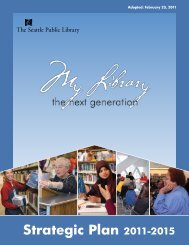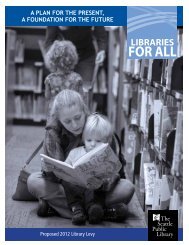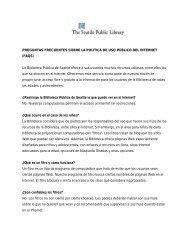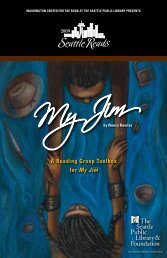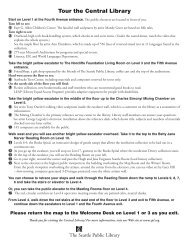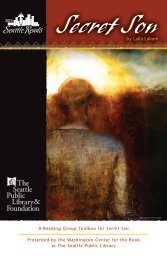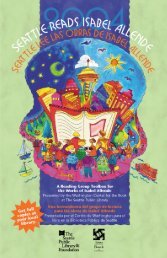Download - Seattle Public Library
Download - Seattle Public Library
Download - Seattle Public Library
Create successful ePaper yourself
Turn your PDF publications into a flip-book with our unique Google optimized e-Paper software.
At one point Gogol goes home and his father starts talking to Manhattanites<br />
about how you have to be careful where you park in their quiet suburban towns<br />
and Gogol is irritated by his parents’ “perpetual fear of disaster.” For me that<br />
was a telling moment of how immigrants, no matter how long they live here,<br />
never quite feel safe.<br />
Yes, absolutely. I have observed that with my parents. Here is one of the things<br />
that tipped me off early. None of my friends’ parents locked their doors. We grew<br />
up in a safe town, a sleepy neighborhood, and I’d go to my friends’ homes and their<br />
front doors were open and back doors were open. My parents were always locking<br />
the door, locking the garage, closing the windows, locking the windows every night,<br />
and I think it’s just a sense of not feeling on firm ground. And you want to feel<br />
protected somehow.<br />
Why have you said you inherited a sense of exile from your parents?<br />
I think that I never feel fully part of the world I was brought up in. My parents<br />
were always very resistant in many ways to living in America and missed India so<br />
much and had a lot of misgivings about their lives here. It was hard for me to think<br />
of myself as fully American. I thought it would be very much a betrayal of my parents<br />
and what they believed and who they are. My parents feel less foreign now than they<br />
did 30 years ago but they still feel like outsiders.<br />
How then did you feel when you experienced your parents on trips to India?<br />
How were they transformed? Gogol is amazed as his mother roams around<br />
Kolkata with ease, shopping at New Market, going to films with her friends.<br />
My parents turned into different people. It was like those weekend parties,<br />
but even more. It was truly a transformation. They were so much more relaxed, so<br />
much more at ease and I felt there was happiness that they were deprived of in their<br />
normal lives and that they could finally connect to. When I think of it now and I try<br />
to imagine what it would be like to see my parents and my sister once every two or<br />
three years, I am amazed at what my parents dealt with.<br />
When I was growing up, the separation felt so great, so insurmountable.<br />
There was no e-mail. Phone lines were dreadful and so expensive, and every call<br />
from India was bad news. The world seemed so much more vast and so much more<br />
difficult to navigate.<br />
But does that put a weird pressure on people like you, the second generation,<br />
to see your parents so palpably happy in India and realizing that in some ways<br />
they gave up this happiness for a better life for you?<br />
This was one of the things that really separated me from my parents. I could try<br />
to sympathize, empathize the best that I could, but the fact of the matter is that my<br />
connection to India will never be what my parents’ is. I always feel I both belong and<br />
don’t belong there. But the older I’ve gotten the more I realize I do belong more to<br />
America than India just because I have spent so much more of my life here.<br />
But I have often wondered why did my parents really come here. So many of<br />
these Bengali immigrants don’t really come to America for a life and death situation.<br />
Most of them have not escaped excruciating war, poverty, or political persecution<br />
that many other immigrants have experienced. Not to say their experiences were not<br />
painful, but my parents were so ambivalent and so guilt-ridden about coming here.<br />
That’s because they came essentially for opportunity and a better life. But my parents<br />
could easily have stayed in Kolkata and raised a family and had a nice home. Coming<br />
to America was a choice to have a better life for themselves and their children,<br />
thereby sacrificing connections to their families.<br />
But though you now feel more American than Indian, are you surprised that the<br />
first stories you wrote were set in India? I read you wrote your first novel when<br />
you were seven. Was that set in India?<br />
(Laughs) I called them novels but they weren’t very long. They were just stories<br />
about girls having various adventures in boarding schools. Some of them were with<br />
supernatural powers.<br />
The first stories I wrote from Interpreter of Maladies were set in India. But before<br />
that I wrote many other stories I was not happy with. Maybe it was the distance that<br />
allowed me to write about India. Often, for a writer the hardest things to write about<br />
are the things that are closest because you have to be objective. It’s a greater challenge<br />
for me to tell a story like the one in The Namesake.<br />
Your work is so tied to ethnicity and roots. Yet your husband is Guatemalanborn<br />
of Greek heritage. What do you think of roots and knowing where you<br />
come from when you look at your son?<br />
I have never felt a strong affiliation with any nation or ethnic group. I always<br />
felt between the cracks of two cultures. So much of it was about where I was and<br />
who was viewing me. When I went to Calcutta my relatives would think of me so<br />
much as American. A foreigner. In America it’s always, you are Indian, when did you<br />
come here.<br />
I hope for my son that it will be something he may be confused about for a time<br />
but that he will accept it and just understand that this is what can happen and it’s<br />
neither a good thing nor a bad thing to be a little mixed up.




